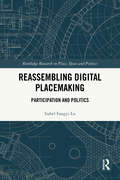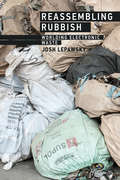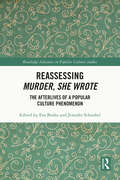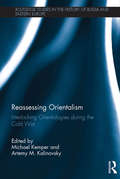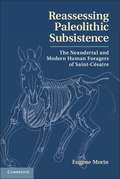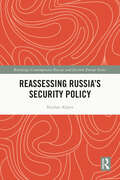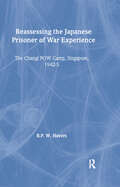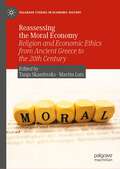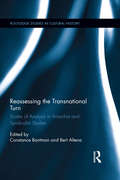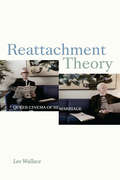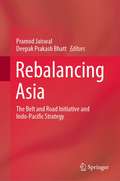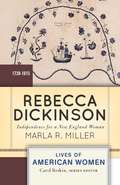- Table View
- List View
Reasoning Indian Politics: Philosopher Politicians to Politicians Seeking Philosophy
by Narendar Pani Anshuman BeheraThis volume examines the multiple forms of reasoning in Indian politics and explores a framework to understand them. In the process, it looks at a series of issues involving the relationship between politics and philosophy, including the status of political theory, political practices, identity politics, and political ontology. The book argues that in the years leading up to and soon after independence, the task of conceptualizing politics was largely in the domain of practising politicians who built theories and philosophical methods, and further took those visions into the practice of their politics. It maintains that Indian politicians since then have not been as inclined to articulate their theories or methods of politics. This book traces the transition from philosopher politicians to politicians seeking philosophy in Indian polity in the post-independence era and its implications for current practices. It views Indian political philosophy from the standpoints of political theorists, philosophers, and practitioners. With expert and scholarly contributions, this volume will be of interest to students and researchers of Indian political thought and political philosophy, social sciences, and humanities.
Reasoning about Preference Dynamics
by Fenrong LiuOur preferences determine how we act and think, but exactly what the mechanics are and how they work is a central cause of concern in many disciplines. This book uses techniques from modern logics of information flow and action to develop a unified new theory of what preference is and how it changes. The theory emphasizes reasons for preference, as well as its entanglement with our beliefs. Moreover, the book provides dynamic logical systems which describe the explicit triggers driving preference change, including new information, suggestions, and commands. In sum, the book creates new bridges between many fields, from philosophy and computer science to economics, linguistics, and psychology. For the experienced scholar access to a large body of recent literature is provided and the novice gets a thorough introduction to the action and techniques of dynamic logic.
Reasoning from Race: Feminism, Law, and the Civil Rights Revolution
by Serena MayeriIn the 1960s and 1970s, analogies between sex discrimination and racial injustice became potent weapons in the battle for women s rights, as feminists borrowed rhetoric and legal arguments from the civil rights movement. Serena Mayeri s Reasoning from Race is the first history of this key strategy and its consequences for American law.
Reasoning in Measurement (History and Philosophy of Technoscience)
by Nicola Mößner and Alfred NordmannThis collection offers a new understanding of the epistemology of measurement. The interdisciplinary volume explores how measurements are produced, for example, in astronomy and seismology, in studies of human sexuality and ecology, in brain imaging and intelligence testing. It considers photography as a measurement technology and Henry David Thoreau's poetic measures as closing the gap between mind and world. By focusing on measurements as the hard-won results of conceptual as well as technical operations, the authors of the book no longer presuppose that measurement is always and exclusively a means of representing some feature of a target object or entity. Measurement also provides knowledge about the degree to which things have been standardized or harmonized – it is an indicator of how closely human practices are attuned to each other and the world.
Reassembling Digital Placemaking: Participation and Politics (Routledge Research in Place, Space and Politics)
by Isabel Fangyi LuThis book presents digital placemaking as a new testing ground for urban democracy. It explores the participatory practices of digital placemaking and their implications on blurring formal and informal boundaries of decision-making and urban politics.Drawing on examples from Australia, China and Taiwan, the book examines how contemporary cities are witnessing an era when digitality becomes a mode of placemaking and participation becomes an urban condition. Such developments manifest as urban activism, creative branding, tech placemaking and digital governance that trigger changes in urban engagement and politics. This book views digital placemaking through an assemblage lens to demonstrate how it can be a relational site of contentions and collaborations among civil society, industries and governments without observance of strict boundaries. Contrary to an often binary and zero-sum reading of urban politics, this book advocates for a tripartite assemblage model of urban politics that is neither hierarchical nor deterministic. This book proposes an ouroboros model as a systematic approach that conceptually anchors digital placemaking studies to the nexus of urban institutions and digital technologies. It reconceptualises urban politics as a relational process of nuances, contingency and complexity in the flux of cosmopolitan power movements and inquiries. Ultimately, the book develops the notion of socio-technical natality to counter the myth of tech inevitability and instil a thesis of hope and change.This book will interest researchers, policymakers and professionals in urban studies, media studies, cultural studies, urban communication, creative placemaking, community engagement, urban advocacy and urban governance.
Reassembling International Theory: Assemblage Thinking and International Relations
by Simon Curtis Michele AcutoWhat can 'assemblage' thinking contribute to the study of international relations theory? This study seeks to investigate how the various debates on assemblages in social theory can contribute to generating critical considerations on the connections and dissociation of political agency, physical world and international dynamics.
Reassembling Motherhood: Procreation and Care in a Globalized World
by Sonya Michel Jane Jenson Yasmine ErgasThe word “mother” traditionally meant a woman who bears and nurtures a child. In recent decades, changes in social norms and public policy as well as advances in reproductive technologies and the development of markets for procreation and care have radically expanded definitions of motherhood. But while maternity has become a matter of choice for more women, the freedom to make reproductive decisions is unevenly distributed. Restrictive policies, socioeconomic disadvantages, cultural mores, and discrimination force some women into motherhood and prevent others from caring for their children.Reassembling Motherhood brings together contributors from across the disciplines to consider the transformation of motherhood as both an identity and a role. It examines how the processes of bearing and rearing a child are being restructured as reproductive labor and care work change around the globe. The authors examine issues such as artificial reproductive technologies, surrogacy, fetal ultrasounds, adoption, nonparental care, and the legal status of kinship, showing how complex chains of procreation and childcare have simultaneously generated greater liberty and new forms of constraint. Emphasizing the tension between the liberalization of procreation and care on the one hand, and the limits to their democratization due to race, class, and global inequality on the other, the book highlights debates that have emerged as these multifaceted changes have led to both the fragmentation and reassembling of motherhood.
Reassembling Rubbish: Worlding Electronic Waste (The\mit Press Ser.)
by Josh LepawskyAn examination of the global trade and traffic in discarded electronics that reframes the question of the “right” thing to do with e-waste.The prevailing storyline about the problem of electronic waste frames e-waste as generated by consumers in developed countries and dumped on people and places in developing countries. In Reassembling Rubbish, Josh Lepawsky offers a different view. In an innovative analysis of the global trade and traffic in discarded electronics, Lepawsky reframes the question of the “right” thing to do with e-waste, mapping the complex flows of electronic materials. He counters the assumption that e-waste is a post-consumer problem, pointing out that waste occurs at all stages of electronic materials' existence, and calls attention to the under-researched world of reuse and repair.Lepawsky explains that there are conflicting legal distinctions between electronic waste and non-waste, and examines a legal case that illustrates the consequences. He shows that patterns of trade do not support the dominant narrative of e-waste dumping but rather represent the dynamic ecologies of repair, refurbishment, and materials recovery. He asks how we know waste, how we measure it, and how we construe it, and how this affects our efforts to mitigate it. We might not put so much faith in household recycling if we counted the more massive amounts of pre-consumer electronic waste as official e-waste. Lepawsky charts the “minescapes,” “productionscapes,” and “clickscapes” of electronics, and the uneven “discardscapes” they produce. Finally, he considers both conventional and unconventional e-waste solutions, including decriminalizing export for reuse, repair, and upgrade; enabling ethical trade in electronics reuse, repair, refurbishment, and recycling; implementing extended producer responsibility; and instituting robust forms of public oversight.
Reasserting the Public in Public Services: New Public Management Reforms (Routledge Studies in Governance and Public Policy)
by M. RameshAfter two decades of dominating the public sector reform agenda, privatization is on the wane as states gradually reassert themselves in many formerly privatized sectors. The change of direction is a response to the realization that privatization is not working as intended, especially in public service sectors. This landmark volume brings together leading social scientists, including B. Guy Peters, Anthony Cheung and Jon Pierre, to systematically discuss the emerging patterns of the reassertion of the state in the delivery of essential public services. The state under these emerging arrangements assumes overall responsibility for and control over essential public service delivery, yet allows scope for market incentives and competition when they are known to work. The recent reforms thus display a more pragmatic and nuanced understanding of how markets work in public services . The first part of the book provides the theoretical context while the second provides sectoral studies of recent reforms in healthcare, education, transportation, electricity and water supply. It includes case studies from a range of countries: Brazil, China, South Korea, Singapore, Thailand, Vietnam, USA, Hong Kong and the UK. This book will be of interest to students and scholars in Political Science, Public Administration, Public Policy, Geography, Political Economy, Sociology, and Urban Planning.
Reassessing Attachment Theory in Child Welfare: A critical appraisal
by Sue White Trish WalshThis book offers an analysis and summery of the use and limitations of child attachment theory as the basis for decision-making and planning in contemporary child welfare practice. This book explores controversies related to increasing diagnoses of ‘attachment disorder’ in child welfare assessments and arguments both for and against the use of attachment specific therapies for children in care. The author calls for a new pedagogy of relational child welfare and considers the relevance of attachment theory to transnational and migrant families, refugees fleeing conflict, adoptive and surrogate children in diverse families and the increased number of families that are in poverty after the global financial crisis.
Reassessing Cold War Europe (Routledge Studies in the History of Russia and Eastern Europe)
by Sari Autio-SarasmoThis book presents a comprehensive reassessment of Europe in the Cold War period, 1945-91. Contrary to popular belief, it shows that relations between East and West were based not only on confrontation and mutual distrust, but also on collaboration. The authors reveal that - despite opposing ideologies - there was in fact considerable interaction and exchange between different Eastern and Western actors (such states, enterprises, associations, organisations and individuals) irrespective of the Iron Curtain. This book challenges both the traditional understanding of the East-West juxtaposition and the relevancy of the Iron Curtain. Covering the full period, and taking into account a range of spheres including trade, scientific-technical co-operation, and cultural and social exchanges, it reveals how smaller countries and smaller actors in Europe were able to forge and implement their agendas within their own blocs. The books suggests that given these lower-level actors engaged in mutually beneficial cooperation, often running counter to the ambitions of the bloc-leaders, the rules of Cold War interaction were not, in fact, exclusively dictated by the superpowers.
Reassessing Feminist Legal Theories (Gender Perspectives in Law #5)
by Miodrag A. Jovanović Bojan Spaic Nicola Lacey Ana ZdravkovićThe volume is a result of a much-needed effort to rethink traditional legal concepts in a gender-sensitive and gender competent manner. The book deals with topics as jurisprudence and gender, feminist approaches to jurisprudence: liberalism, difference, dominance, anti-essentialism, postmodernism, positivism, natural law, feminist jurisprudence, developments in feminist legal theory as well as feminist critiques of traditional legal concepts.
Reassessing Gender and Achievement: Questioning Contemporary Key Debates
by Christine Skelton Becky FrancisChallenging current theories about gender and achievement, this book assesses the issues at stake and analyses the policy drives and changing perceptions of gender on which the 'gender and achievement' debates are based. This new topical book guides the reader through the different theories and approaches, drawing together and reviewing work on gender and educational performance. The authors also highlight the continuing problems experienced by girls in terms of achievement and classroom interaction. The subjects covered include: perspectives on gender and achievement the construction of gender and achievement in education policy evaluating boys’ underachievement the future for boys and girls? raising achievement: 'What works in the classroom?' Teachers, education professionals and students engaged in teacher training will welcome the editors' objective yet critical expertise.
Reassessing Jewish Life in Medieval Europe
by Robert ChazanThis book re-evaluates the prevailing notion that Jews in medieval Christian Europe lived under an appalling regime of ecclesiastical limitation, governmental exploitation and expropriation, and unceasing popular violence. Robert Chazan argues that, while Jewish life in medieval Western Christendom was indeed beset with grave difficulties, it was nevertheless an environment rich in opportunities; the Jews of medieval Europe overcame obstacles, grew in number, explored innovative economic options, and fashioned enduring new forms of Jewish living. His research also provides a reconsideration of the legacy of medieval Jewish life, which is often depicted as equally destructive and projected as the underpinning of the twentieth-century catastrophes of antisemitism and the Holocaust. Dr Chazan's research proves that, although Jewish life in the medieval West laid the foundation for much Jewish suffering in the post-medieval world, it also stimulated considerable Jewish ingenuity, which lies at the root of impressive Jewish successes in the modern West.
Reassessing Lee Kuan Yew's Strategic Thought (Routledge Studies in the Modern History of Asia)
by Ang Cheng GuanBuilding on the author’s 2012 book, Lee Kuan Yew’s Strategic Thought, this new book presents a comprehensive overview of Lee Kuan Yew’s strategic thought over the course of his entire life. It analyses the factors underlying Lee Kuan Yew’s thinking, discusses his own writings and speeches, and shows how his thinking on foreign policy, security and international relations evolved. It also appraises writing about Lee Kuan Yew and memorialisation of him, assessing how views of his legacy have changed and continue to change.
Reassessing Murder, She Wrote: The Afterlives of a Popular Culture Phenomenon (Routledge Advances in Popular Culture Studies)
by Eva Burke Jennifer SchnabelThis book provides a critical overview of the cultural impact of the Murder, She Wrote TV series and its paratextual elements, including board and video games, podcasts, fan conventions, collectible figures, and ghostwritten novels. It also explores the series’ position within the crime genre, particularly its engagement with earlier iterations of the ‘lady detective’.Bringing together a broad range of experts, the book includes contributions from both academics and crime fiction novelists to offer a wide-ranging view of this popular series and its afterlives.Suitable for scholars and students working on popular culture, crime fiction, TV studies or fan studies, this collection provides an interdisciplinary analysis of one of the most successful and enduring female-fronted detective series in history.
Reassessing Orientalism: Interlocking Orientologies during the Cold War (Routledge Studies in the History of Russia and Eastern Europe)
by Michael Kemper Artemy M. KalinovskyOrientalism as a concept was first applied to Western colonial views of the East. Subsequently, different types of orientalism were discovered but the premise was that these took their lead from Western-style orientalism, applying it in different circumstances. This book, on the other hand, argues that the diffusion of interpretations and techniques in orientalism was not uni-directional, and that the different orientologies – Western, Soviet and oriental orientologies – were interlocked, in such a way that a change in any one of them affected the others; that the different orientologies did not develop in isolation from each other; and that, importantly, those being orientalised were active, not passive, players in shaping how the views of themselves were developed.
Reassessing Paleolithic Subsistence: The Neandertal and Modern Human Foragers of Saint-Césaire
by Eugène MorinThe contribution of Neandertals to the biological and cultural emergence of early modern humans remains highly debated in anthropology. Particularly controversial is the long-held view that Neandertals in Western Europe were replaced 30,000 to 40,000 years ago by early modern humans expanding out of Africa. This book contributes to this debate by exploring the diets and foraging patterns of both Neandertals and early modern humans. Eugène Morin examines the faunal remains from Saint-Césaire in France, which contains an exceptionally long and detailed chronological sequence, as well as genetic, anatomical, and other archaeological evidence to shed new light on the problem of modern human origins.
Reassessing Russia's Security Policy (Routledge Contemporary Russia and Eastern Europe Series)
by Nurlan AliyevThis book provides a detailed analysis of the evolution of Russia’s security policy. Based on extensive original research, including an analysis of official documents, political and military elite speeches, interviews, and reports, and considering the subject from the early twentieth century onwards, the book evaluates how far Russia’s security policy is underpinned by “strategic asymmetry” – the acceptance by Russia of its inferior military position, and the pursuit of its strategic aims through the application of a variety of methods, military and non-military, including the manipulation of public opinion, the use of economic leverage and external security approaches - known as Russia’s “hybrid war operations” - to gain the advantage over a militarily and economically superior adversary. The book discusses how Russia’s security policy has been and is being applied in specific cases, including the present war in Ukraine, the Russian anti-satellite program and Russia’s contemporary Afghan policy. The aim of the book is to explain how and why Russia uses different security strategies and methods using these three cases.
Reassessing the Japanese Prisoner of War Experience: The Changi Prisoner of War Camp in Singapore, 1942-45
by R P Havers R. P. HaversPopular perceptions of life in Japanese prisoner of war camps are dominated by images of emaciated figures, engaged in slave labour, and badly treated by their captors. This book, based on extensive original research, shows that this view is quite wrong in relation to the large camp at Changi, which was the main POW camp in Singapore. It demonstrat
Reassessing the Moral Economy: Religion and Economic Ethics from Ancient Greece to the 20th Century (Palgrave Studies in Economic History)
by Tanja Skambraks Martin LutzThis book examines the concept of moral economy originally established by E.P. Thompson, focusing on the impact of religious norms on economic practice. With each chapter discussing a different empirical case study, the interrelations of the economy and religion are explored from antiquity through to the 20th century. The long-term trajectory and comparative perspective allows for moral economy to be seen in relation to ancient Greek commerce, medieval pawn-broking, Christian and Jewish economic ethics, urban social politics during the Plague, the Jesuit mission in Paraguay, the Ottoman Empire, religion in modern American capitalism, and Catholic attitudes toward taxation.This book aims to provide insight into how moral thinking about the economy and economic practice has evolved from a long historic perspective. It will be relevant to students and researchers interested in economic history and cultural economics.
Reassessing the Transnational Turn: Scales of Analysis in Anarchist and Syndicalist Studies (Routledge Studies in Cultural History #33)
by Constance Bantman Bert AltenaThis edited volume reassesses the ongoing transnational turn in anarchist and syndicalist studies, a field where the interest in cross-border connections has generated much innovative literature in the last decade. It presents and extends up-to-date research into several dynamic historiographic fields, and especially the history of the anarchist and syndicalist movements and the notions of transnational militancy and informal political networks. Whilst restating the relevance of transnational approaches, especially in connection with the concepts of personal networks and mediators, the book underlines the importance of other scales of analysis in capturing the complexities of anarchist militancy, due to both their centrality as a theme of reflection for militants, and their role as a level of organization. Especially crucial is the national level, which is often overlooked due to the internationalism which was so central to anarchist ideology. And yet, as several chapters highlight, anarchist discourses on the nation (as opposed to the state), patriotism and even race, were more nuanced than is usually assumed. The local and individual levels are also shown to be essential in anarchist militancy.
Reattachment Theory: Queer Cinema of Remarriage (a Camera Obscura book)
by Lee WallaceIn Reattachment Theory Lee Wallace argues that homosexuality—far from being the threat to “traditional” marriage that same-sex marriage opponents have asserted—is so integral to its reimagining that all marriage is gay marriage. Drawing on the history of marriage, Stanley Cavell's analysis of Hollywood comedies of remarriage, and readings of recent gay and lesbian films, Wallace shows that queer experiments in domesticity have reshaped the affective and erotic horizons of heterosexual marriage and its defining principles: fidelity, exclusivity, and endurance. Wallace analyzes a series of films—Dorothy Arzner's Craig's Wife (1936); Tom Ford's A Single Man (2009); Lisa Cholodenko's High Art (1998), Laurel Canyon (2002), and The Kids Are All Right (2010); and Andrew Haigh's Weekend (2011) and 45 Years (2015)—that, she contends, do not simply reflect social and legal changes; they fundamentally alter our sense of what sexual attachment involves as both a social and a romantic form.
Rebalancing Asia: The Belt and Road Initiative and Indo-Pacific Strategy
by Pramod Jaiswal Deepak Prakash BhattThis book explores the struggle between China and the United States to expand their influence in Asia through economic assistance and defensive alliances. It brings together the diverse viewpoints of scholars from various countries on how Asian countries will exploit this geo-strategic competition to pursue their national interests, while also balancing their relations with the two great powers. The book offers a valuable asset for all those who have an interest in great power politics and international relations, especially academics, policymakers and security experts.
Rebecca Dickinson
by Marla R. MillerRebecca Dickinson’s powerful voice, captured through excerpts from the pages of her journal, allows colonial and revolutionary-era New England to come alive. Dickinson’s life illustrates the dilemmas faced by many Americans in the decades before, during, and after the American Revolution, as well as the paradoxes presented by an unmarried woman who earned her own living and made her own way in the small town where she was born. Rebecca Dickinson: Independence for a New England Woman, uses Dickinson’s world as a lens to introduce readers to the everyday experience of living in the colonial era and the social, cultural, and economic challenges faced in the transformative decades surrounding the American Revolution. About the Lives of American Women series: Selected and edited by renowned women’s historian Carol Berkin, these brief biographies are designed for use in undergraduate courses. Rather than a comprehensive approach, each biography focuses instead on a particular aspect of a women’s life that is emblematic of her time, or which made her a pivotal figure in the era. The emphasis is on a "good read,” featuring accessible writing and compelling narratives, without sacrificing sound scholarship and academic integrity. Primary sources at the end of each biography reveal the subject’s perspective in her own words. Study questions and an annotated bibliography support the student reader.




